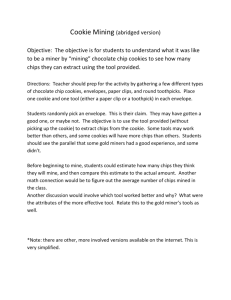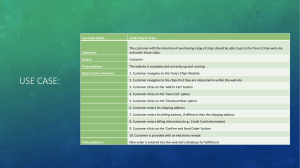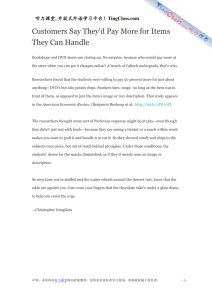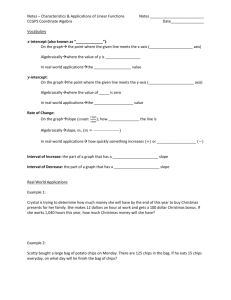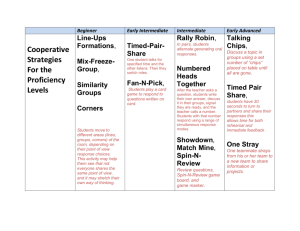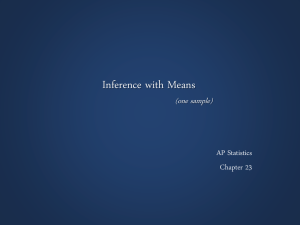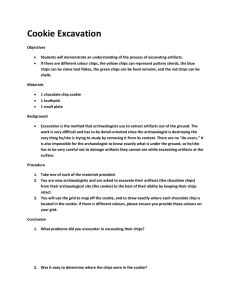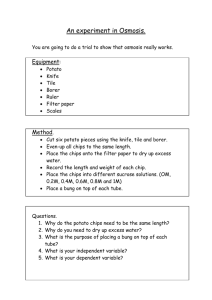File - phsapstatistics
advertisement
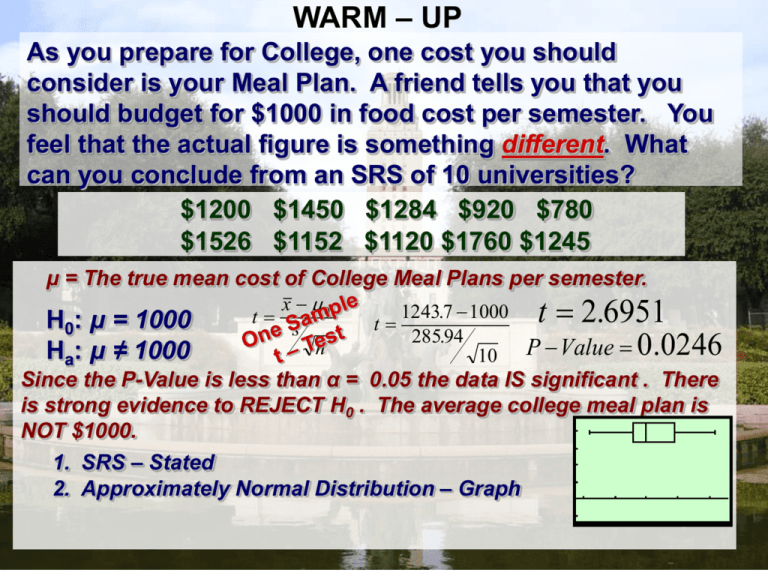
WARM – UP As you prepare for College, one cost you should consider is your Meal Plan. A friend tells you that you should budget for $1000 in food cost per semester. You feel that the actual figure is something different. What can you conclude from an SRS of 10 universities? $1200 $1450 $1284 $920 $780 $1526 $1152 $1120 $1760 $1245 μ = The true mean cost of College Meal Plans per semester. x 0 1243.7 1000 H0: μ = 1000 Ha: μ ≠ 1000 t t s n 285.94 10 t 2.6951 P Value 0.0246 Since the P-Value is less than α = 0.05 the data IS significant . There is strong evidence to REJECT H0 . The average college meal plan is NOT $1000. 1. SRS – Stated 2. Approximately Normal Distribution – Graph CHAPTER 25 MATCHED PAIRS t–TESTS Objective: Use the One sample t procedures to interpret a Matched Pairs t-test and be able to make inferences about the differences in the two treatments which share a common characteristic. In a Matched Pairs design subjects are matched in Homogeneous pairs or the same subject is used in both treatments. A common type is a Before-and-After Design. This leads to two Dependent data sets of which you subtract. The Matched Pairs t-Procedures The Parameters and Statistics: μd = the true mean difference in the two populations. xd = the sample mean of all the differences of each individual pairing. sd = the sample standard deviation of all the differences 1. Confidence Interval: sd xd t n * 2. T-Test: Precede with a ONE SAMPLE t-Test for the mean difference with μd always equal to Zero. H0: μd = 0 Ha: μd ≠, <, or > 0 xd 0 t sd n P-VALUES μd<0: tcdf(-E99, t, df) μd>0: tcdf(t, E99, df) μd≠0: 2·tcdf(|t|, E99, df) EXAMPLE 1: Many drivers of cars that can run on regular gas actually buy premium in the belief that they will get better gas mileage. To test this, 10 cars are randomly selected. Each car is run using both regular and premium gas. The mileage is recorded. Is there sufficient evidence at the 0.05 level to support the belief? Car # Reg. Prem. Prem. –Reg. 1 16 19 3 2 20 22 2 3 21 24 3 4 22 24 2 5 23 25 2 6 22 25 3 7 27 26 -1 8 25 26 1 9 27 28 1 10 28 32 4 μd = The true mean DIFFERENCE in gas mileage (Premium – Regular) H0: μd = 0 Ha: μd > 0 t xd 2 sd 1414 . xd 0 sd n t 20 1414 . 10 t 4.4721 P Value 0.0008 Since the P-Value < α = 0.05 - REJECT H0 STRONG evidence that Premium Gas does improve gas mileage. 1. SRS – Stated 2. Approximately Normal Distribution – Graph EXAMPLE 2: “Freshman – 15” Many people believe that students gain a significant amount of weight their freshman year of college. Is there enough evidence at the 5% level to support that there is a weight increase? Use the weights of 6 randomly chosen students. Student weights were measure at the beginning and at the end of the fall semester. Begin End End– Begin 1 171 168 -3 2 110 111 1 3 134 136 2 4 115 119 4 5 150 155 5 6 104 106 2 μd = The true mean DIFFERENCE in Weight in pounds (End of Semester – Beginning) 1.833 0 xd d H :μ =0 0 d t sd t Ha: μd > 0 n xd 1.833 sd 2.787 t 1.611 2.787 6 P Value 0.0840 Since the P-Value is NOT less than α = 0.05 Fail to REJECT H0 . The belief that Freshman experience weight increase `is not supported. 1. SRS – Stated 2. Approximately Normal Distribution – Graph EXAMPLE 3: The maker of a new tire claims that his Tires are superior in all road conditions. He claims that with his tires there is no difference in stopping distance between dry or wet pavement. To test this you select an SRS of 9 cars and at 60 mph you slam on the breaks. Estimate the Mean difference in stopping distance in feet with a 90% Confidence Interval. μd= The true mean DIFFERENCE in stopping distance in feet (Wet – Dry Pavement) s Matched Pairs xd t * d n 1-Sample xd 55 sd 10.210 t – Interval F I H K 55 1.86 10.210 9 55 7.848 We are 90% Confident that the True mean difference in stopping distance in feet between Wet Pavement – Dry Pavement is between 48.671 ft and 61.329 ft. 1. SRS – Stated 2. Approximately Normal Distribution – Graph Car # Wet Dry Wet – Dry 1 201 150 51 2 220 147 73 3 192 136 56 4 182 130 52 5 173 134 39 6 202 134 68 7 180 128 52 8 192 136 56 9 206 158 48 Chips Ahoy used to advertise “1000 Chips in Every Bag!” 1. How would YOU do a significance test to test this? 2. What issues do you think would arise and how would you over come them? 1000 Chips in Every Bag! Chips Ahoy used to advertise “1000 Chips in Every Bag!” With 38 cookies in each bag, the true mean number of chips in each cookie should be 26.3 chips per cookie. Because there was a suspicion of LESS than 26.3 chip per cookie the company disregarded the ad. Test this claim by crumbling cookies and counting the number of chips in each. a.) Is there evidence to support the company’s decision. Gather evidence and Conduct a Significance test. b.) Estimate the true # of chips in the bag by finding a 95% Confidence Interval for the true # of chips per cookie and then multiply it by 38. c.) Eat your evidence. 1000 Chips in Every Bag!
